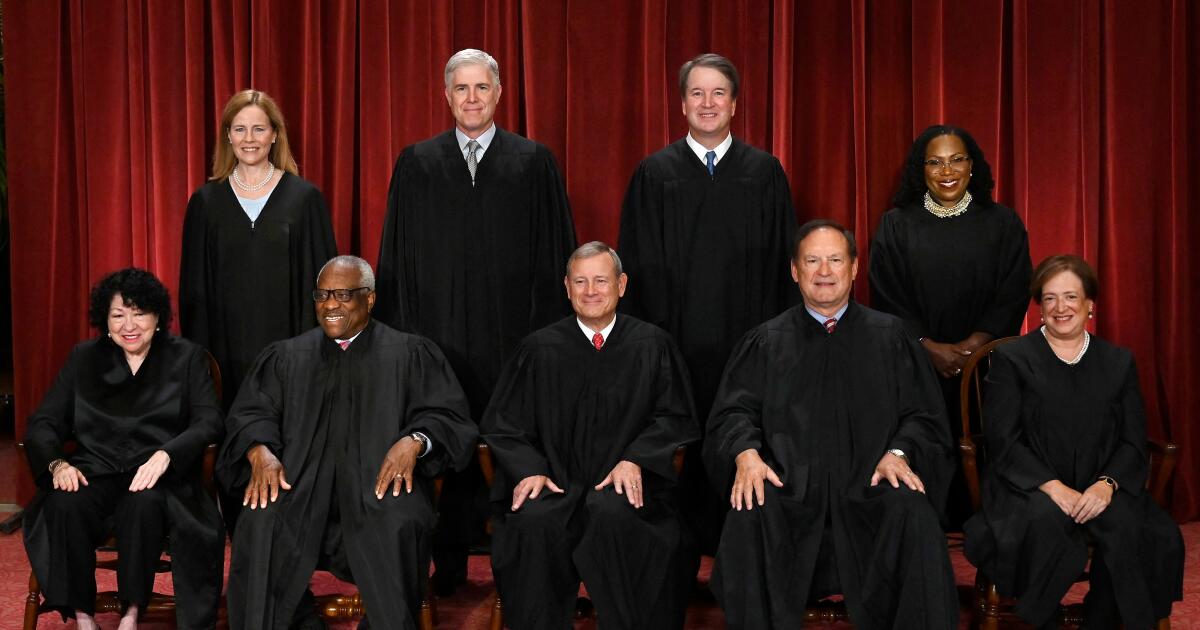The Supreme Court on Monday issued a code of conduct for itself for the first time, but it acknowledged the rules are “not new” and simply restate the principles it says its justices have long followed.
The announcement said the justices hoped the code would “dispel this misunderstanding” that they “regard themselves as unrestricted by any ethics rules.”
But this modest effort is unlikely to end the controversy created by Justice Clarence Thomas and his free luxury vacations, paid for by Texas real estate billionaire Harlan Crow.
That’s because there is still no enforcement mechanism behind the court’s code of conduct, and each of the justices remains free to decide for themselves whether particular gifts or travels cross a line and are prohibited.
All federal judges already follow the same code of conduct, but unlike the justices, they may face an investigation or even a reprimand for an ethics violation.
University of Virginia law professor Amanda Frost called Monday’s announcement “a small but significant step in the right direction. I am heartened that all nine signed onto a statement making clear that certain conduct is not permissible, such as speaking before a group that has a substantial financial interest in a case before the court.”
But there is “no acknowledgment of past transgressions, no enforcement mechanism and no guarantee of increased transparency or accountability,” she said.
The Supreme Court has maintained that its justices are independent and are not subject to oversight from outside authorities — or even from other members of the court.
Some ethics experts have argued that the justices as a group should sometimes decide whether one of them has a conflict of interest that would call for stepping aside in a particular case.
For example, the court last year was called upon to decide whether the White House could be forced to turn over emails and other documents to the National Archives and the House committee investigating the Jan. 6 attack on the Capitol.
Thomas’ wife, Ginni, is a conservative activist and had sent emails to then-President Trump’s chief of staff urging him to keep fighting Joe Biden’s election victory. It appeared more of her emails could be revealed if the disclosures were not blocked by the court.
But Thomas did not step aside from ruling on the case. He dissented alone when the appeal was turned down.
The new rules maintain the existing standard that justices decide for themselves whether they should step aside from a case. “A justice is presumed impartial and has an obligation to sit unless disqualified,” the rules say.
Until this year, the Supreme Court justices were not seen as having serious ethical problems. By law, judges and justices are required to disclose the cost of travel and lodging that is paid for by others.
Ethics laws forbid judges to accept gifts from people “whose interests may be substantially affected” by a decision. The justices are also required by law to step aside or recuse themselves from deciding cases where their “impartiality might reasonably be questioned.”
But earlier this year, ProPublica and other news organizations reported Thomas has regularly taken large and undisclosed gifts that came to him only because he sits on the nation’s highest court.
They include a decade’s worth of free luxury vacations and travel on a private jet owned by Crow. Private school tuition for a child Thomas was raising was paid for as was the purchase and renovation of his mother’s house in Savannah, Ga.
Thomas turned to another wealthy friend to pay $267,000 to buy him a luxury recreational vehicle.
In June, ProPublica reported that in 2008 Justice Samuel A. Alito Jr. had taken a free and undisclosed fishing trip to Alaska on a private jet owned by hedge fund billionaire Paul Singer.
Six years later, the Supreme Court by a 7-1 vote ruled against Argentina and in favor of NML Capital, a hedge fund founded by Singer that had been suing over defaulted bonds since 2003.
Alito joined the majority. He wrote in the Wall Street Journal that he did not step aside from the case because he “was not aware and had no good reason to be aware that Mr. Singer had an interest” in it, even though his role was highlighted in many news stories.
One of the revised new rules announced Monday could have ensnared Thomas if all of his travels were known.
In September, ProPublica reported Thomas took another undisclosed private jet trip to Palm Springs to speak at a Koch family event in 2018. The Koch’s fundraising group was then fighting in court in California against a state regulation that required tax-exempt charities to disclose their major donors. The IRS requires the same disclosure, and state officials said this information on file helps investigate possible fraud by charities.
But the Supreme Court’s conservative majority struck down the state regulation in 2021. Joining the majority, Thomas wrote a separate opinion arguing the court should have gone further to declare the 1st Amendment protects “the privacy of association.” That includes “the right to associate anonymously,” he wrote in Americans for Prosperity vs. Bonta, adding it would cast doubt on “compelled disclosure laws.”
The rules issued Monday say a “justice should not speak to or participate in a meeting organized by a group that has a substantial financial interest in the outcome of a case” or if doing so “would create an appearance of impropriety.”
Ethics experts, progressives and Senate Democrats have pointed to Thomas and Alito as proof the high court’s system of self-policing had failed.
“It’s unacceptable for the highest court in the land to have the lowest ethical standards,” Senate Judiciary Committee Chairman Richard J. Durbin (D-Ill.) said this year.
Republicans and the conservative media, including the Wall Street Journal, stood behind the court and dismissed the ethics controversy as partisan and overblown.
Senate GOP leader Mitch McConnell has dismissed the ethics controversy as an attempt to smear and defame justices appointed by Republican presidents.


